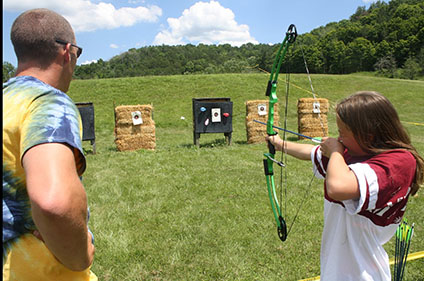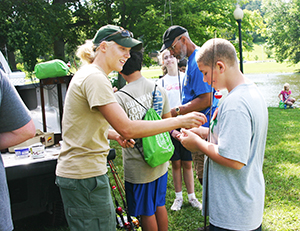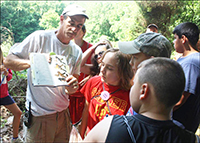About
Due to COVID-19, the West Virginia Junior Conservation Camp went virtual this year! From June 22-25, daily camp videos were broadcast on the DEP's YouTube channel, "Environment Matters," as well as our Facebook page. Links to all virtual camp offerings are available below. The camp playlists also remain on the agency's YouTube channel.
Explore Virtual Camp Activities and Content
-
Welcome to Virtual JCC 2020
Youth Environmental Program Director Annette Hoskins welcomes campers to this year's "Virtual" Junior Conservation Camp.
-
Introduction to the Youth Environmental Program
Junior Conservation Camp is the highlight of the summer for the DEP's Youth Environmental Program. If you'd like to learn more, here's Tom Aluise with a brief introduction.
-
Pollinators
Did you know that one out of every three bites of food we eat relies on pollinators? Everyone know the important role bees play but the DEP's Sara Prior introduces us to some other pollinators that play an important role, too.
Learn more:
-
Water Bottle Wind Spirals Craft
Plastic water bottles can be turned into art using markers and a pair of scissors. The DEP's Beth Henry-Vance shows us how.
-
The Three Rs
Reduce. Reuse. Recycle. We can all help reduce the amount of waste that enters the nation's landfills, or worse yet, is illegally dumped into the environment by following the "Three Rs". The DEP's Shanti Amos explains.
-
Watersheds
In this video, Jesse King from the West Virginia Division of Forestry talks about watersheds and shows some home experiments you can do to learn more about stormwater runoff, sedimentation and erosion.
Learn more about watersheds at projectwet.org
Three, it's a magic number
-
A Drop in the Bucket
Tom Aluise takes a look at our planet's most precious resource - water, and how seven billion people depend on it. While about 70% of Earth's surface is covered by water, only a small fraction is fresh, accessible, drinkable water - a drop in the bucket, so to speak.
Learn more:
- Countries Facing Water Crisis: Nearly 1.8 billion people in seventeen countries, or a quarter of the world’s population, appear to be veering towards a water crisis—with the potential of severe shortages in the next few years.
- Global Water Crisis Facts: As the population of the world grows and the environment becomes further affected by climate change, access to fresh drinking water dwindles.
-
Insect Scavenger Hunt
Susan Parker is having an Insect Scavenger Hunt and you're invited to come along. Learn what differentiates insects from other organisms and the different stages of their life cycles.
Learn more:
- Nature Now: As a school partner, Potomac Valley Audubon Society is creating educational resources for teachers and parents to use for online learning during this challenging time.
- Handbook for Insects: An insect handbook produced by the North Carolina State Extension service.
- Monarch Butterflies: Monarch Butterflies Craft and Activity Book
-
Firearms and Hunter Safety
Sgt. Greg Mullens with the West Virginia Division of Natural Resources has the information young hunters need to know to make their first trip into the woods a safe one. Topics covered are how guns work, important firearm safety practices and West Virginia hunting regulations that apply to young hunters.
-
Trees
Trees are more like us than you may realize. Shanti Amos has the details.
Learn more about urban forestry from the West Virginia Division of Forestry.
-
Nature Journaling
A Nature Journal is a great way to document your adventures and observations in the outdoors. Sara Prior has some tips to get you started.
-
Rock Painting
Beth Henry-Vance teaches techniques of rock painting - a fun craft that you can do to create some cool decorations.
Learn more: Easy Painted Rocks That Are Fun to Make & Tips!
-
Campfire Songs
Gather around the (virtual) campfire as we wrap up today's activities with a singalong with Art Shomo.
 Archery Target Practice
Archery Target Practice
-
Live Webinar: "Amazing Owls"
Recording of Wednesday's webinar - Susan Parker has some amazing owl facts to share.
-
Leave No Trace
Tom Aluise explains the seven core principles of Leave No Trace and how to enjoy nature and the outdoors while protecting natural areas from human impacts.
Learn more from the Center for Outdoor Ethics
-
Kitchen Scrap Garden
Beth Henry-Vance shows another option besides the compost heap for you vegetable kitchen scraps.
-
pH Explained
In chemistry, pH is a scale that is used to specify how acidic or alkaline a water based solution is. Shanti Amos and her husband Doug explain pH and why that's important to the waters of West Virginia.
-
West Virginia Forest Plants
Join Chris Gatens on a nature hike through Kanawha State Forest as he identifies some of the common plants you're likely to see during a walk through the West Virginia woods.
Learn more:
-
The Science of Fires
Jesse King from the West Virginia Division of Forestry explains the science of fire and how different conditions like weather and terrain can speed or slow the spread of a forest fire.
-
Bottle Cap Craft
They're not easy to recycle, so Susan Parker has come up with a way to turn plastic bottle caps into art.
Learn more:
-
Campfire Songs
Gather around the (virtual) campfire again as we wrap up today's activities with another singalong with Art Shomo.
 Counseler helping camper bait a fishing hook
Counseler helping camper bait a fishing hook
-
Live Webinar: "The Problem with Single-Use Plastic Bags and Straws"
The problems associated with plastic pollution in the environment and some of the things you can do to reduce it. Webinar presented by Tom Aluise and Sara Prior of the DEP's Youth Environmental Program as part of this year's Virtual Junior Conservation Camp.
-
Kayaking 101
West Virginia has many great flat water paddling spots to explore. DEP Deputy Environmental Advocate Dennis Stottlemyer shows us the basics of paddling a kayak. Topics covered include water safety, setting up your boat, different kayak strokes and proper paddling techniques.
Learn more: Getting Started with Kayaking
-
Skulls, Antlers and Pelts
Ashley Anderson from the West Virginia Division of Natural Resources shows off different skulls, horns, antlers and pelts from some of the state's native wildlife.
Learn more from the West Virginia Division of Natural Resources
-
Ride the Wild Rapids Game -- Game Board
Discovering ways to help prevent water pollution is the subject of the game "Ride the River Rapids". Tomi Bergstrom from the DEP's Watershed Improvement Branch gives us a tour and a lesson on non-point source pollution.
-
Water Careers
Doug and Shanti Amos discuss the variety of possible careers in the water industry.
-
Virtual JCC 2020 Close
Camp Director Annette Hoskins with a message for everyone who took part in this year's virtual Junior Conservation Camp. We hope to see you all, in person, next summer.
 Counseler showing attendees a guidebook to birds
Counseler showing attendees a guidebook to birds